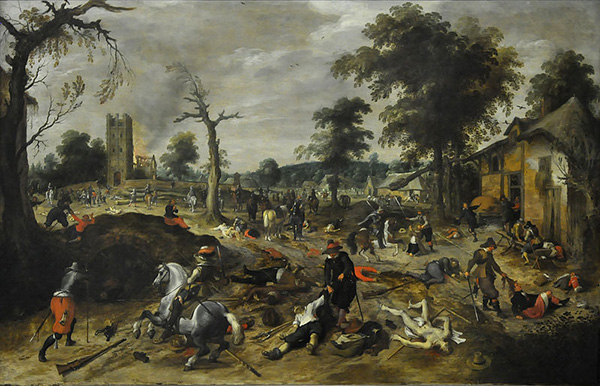Reforging America, Part I
The Crew, American Renaissance, April 14, 2023

Subscribe to future audio versions of AmRen articles here.
Introduction
This two-part series suggests ways for whites to develop race-conscious communities that actively counter the contemporary Western media and government narrative. In it, we explore how whites can encourage traditional values, foster shared sentiment, and integrate their communities into broader society. We intend this series to help white men and women of any age, but we are especially interested in reaching adolescents and young adults, as they are the age groups most directly subjected to the so-called “Diversity, Equity, and Inclusion” programs of state and private institutions. We write from personal experience; many of our own efforts have enjoyed recent, notable success. We believe that the reader will be surprised and encouraged by the novel tactics of our overall approach.
Any questions or comments can be directed to imperiumaeternum14@protonmail.com.
What makes this era unique
Western history shows a remarkable post-Renaissance arc. In the 18th Century, new forms of thought and government conceived in the salons of Paris and the meetinghouses of colonial America challenged ideas about the relationship between man and government. This unleashed an unparalleled growth in productivity, which fueled a new round of European colonization around the world.
Today, the remarkable innovation and creativity that built the great expansive European empires — British, Dutch, French, Russian, Spanish, Portuguese, and German — have come under attack. The descendants of the men who built those empires — today’s white children — are blamed for the actions of their supposedly cruel forefathers and suffer more than most adults can imagine. It is up to the rest of us to ensure their survival.
In school, in media, in medical and financial services, and at every other level of society, the new anti-white dogmas disadvantage white men, women, and children. This anti-white movement follows decades of “critical” approaches to education, whereby long-held truths were overturned. Rather than celebrating the unmatched global prosperity driven by white ingenuity, we find ourselves now asked to apologize for it.
The new dogmas have supplanted the traditional figure of the aged white man made wise by a lifetime of experience with that of the wizened black woman, who draws not from experience but from an imagined, earthy spirituality innate to her and her race. The new “magic Americans” the dogmas revere can seemingly circumvent the laws of nature, rationality, and reason.
The obsession of the media and the arts with such characters and the deliberate over-representation of blacks and other minority groups in every profession tend to foster within whites a sense of inadequacy that undermines the self-confidence of children and neutralizes the potential of adults.
However, as society decays and the abilities of the median individual degrade, whites of high intellect, motivation, and value to their community will inevitably gain relative stature. For that reason, rather than retreating to enclaves or refusing to engage in communities at all, talented whites can empower themselves through their competence. Unlike South Africa, where the situation has progressed beyond repair, the United States is in no imminent risk of total infrastructure collapse, and the demand for both office workers and skilled laborers will be around for a long time. Keep in mind this thought if none other from this series: periods of degeneration offer competent men the fastest paths to power and success.
But do not doubt that this is a period of degeneration. At no point in history has a dominant group so willfully prostrated itself and turned over to others the very keys to its civilization. A sickness in our culture, a self-perpetuating disrespect for our heritage and an internalized distaste for anything exclusively in the white domain is driving this long retreat.
Commentators have offered many explanations for the stunning transformation of the West, including demographic change, the decreased role of religion as a mediating force in society, and the leftist push for critical studies. Today, Indian activists and their white fellow travelers are demanding what they call “land acknowledgments” — public admissions that a given parcel of land was stolen. If one were to suggest to our white ancestors who conquered North America the idea of such land acknowledgements, their response would be total befuddlement. We conquered the land; it is ours. Now, however, we seem intent on giving it away.

Palm Springs, California: ‘Never Forget,’ an installation by Tlingit and Unangax‚ artist Nicholas Galanin at Desert X 2021, a biennial display of art installations meant to be seen by the public in the desert and urban areas of the Coachella Valley of Southern California.(Credit Image: © David Poller/ZUMA Wire)
Yet all hope is not lost; whites do retain economic dominance, and many professionals privately acknowledge that “diversity hires” underperform those hired on merit. Moreover, even the most aggressively indoctrinating school cannot overcome a strong family in which the mother and father instill respect and pride in their children.
Respect must be for oneself, one’s family, and white culture at large. For many Americans, especially those whose ancestors came from Europe, the homogenizing forces applied during the First World War stripped them of their legacy culture in favor of a standardized American culture. There was nothing wrong with that; the United States has thrived on assimilating white immigrants into a distinctive American identity. Looking at historic records, one marvels today at the granularity with which whites were once viewed; today, one will marvel instead at the granularity applied to other races, while whites are lumped together with all peoples from the Iberian Peninsula to the Hindu Kush.
Pride must be in one’s heritage and one’s own achievements. Far too many white children are browbeaten into hating themselves, into devaluing their achievements, and into abandoning their capabilities in pursuit of antisocial behaviors. To inculcate pride, we must look outside the home, to the community.
This series outlines practical methods by which white activists can establish a community that simultaneously promotes individual self-improvement and facilitates the emergence of a white racial identity. Such a community must not be an island, and its members must be integrated members of the broader society while educating others about white-oriented values and norms.
The Warwolves
To understand one strategy employed by men of the West during one of our civilization’s bleakest periods, consider the Thirty Years’ War, which raged mostly in present-day Germany from 1618 to 1648. During that climax of the Counter-Reformation, various Protestant German princes clashed with Catholic Habsburg Imperials while surrounding powers such as the Dutch and Swedes joined on one side or the other. A complex struggle with intermittent lulls and many local changes of allegiance, the war killed over a third of the German population as rogue soldiers, mercenaries, and other marauders slaughtered each other and ravaged civilians. It was essentially a free-for-all, whose brutality and destruction were comparable only to parts of the Second World War, which had a much shorter duration.

The looting of Wommelgem. Sebastian Vrancx (1625-1630)
A work of historical fiction of that era is Der Wehrwolf, or The Warwolf, written by the German natural historian and journalist Hermann Löns in 1910 and published a few years before his death in the First World War. Löns painstakingly researched the Thirty Years’ War and used historically accurate depictions to tell the story of Harm Wulf, a fictional landed peasant farmer of northern Germany who chooses to kill rather than be killed. After witnessing the pillaging of his village and murder of his young family by itinerant soldiers, Wulf joins his fellows in a fierce vigilante force called the “Warwolves,” which protects its remote homeland from inbound threats. They thus establish the roots of a peasant aristocracy. The once peaceful and simple farmers become competent guerillas, enriching themselves and their homesteads with loot from the military patrols they ambush and the thieves they hang in their forest as warnings to future intruders.
The 30 years of warfare require constant struggle and training from Wulf, his comrades, and their children, and though they are generally successful in skirmishing and intimidating their enemies, they lose many loved ones and see many farms burn. Nevertheless, they maintain their belief in Christianity and even in wartime build a beautiful chapel and educate their children with stolen books. By the time the war ends with the Peace of Westphalia, their community is thriving in the heath, with Wulf’s warclub hanging on the parlor wall of his Wulffstead, where it will remain for centuries as a totem of the deeds of the village’s ancestors.
We are not (yet) in such dire trouble as the fictional Harm Wulf, and most of us still face only indirect threats to our own well-being and legacy. But we must choose not to become a conquered people like those who lived in America before our ancestors came. We must band together and reforge our bonds. In this installment, we’ll begin to show you how to do this with people you encounter in everyday life.
Building a crew
The West is defined by its men, and Western men are in decline. Most abstract talk of that decline, voiced publicly by Jordan Peterson, focuses on the need for a “hero’s journey” involving changes to the individual man’s behavior. Unfortunately, Dr. Peterson’s advice often takes on a kind of mock-heroic character. “Cleanse the land of the invader” becomes “clean your room.” “Become a great warrior” becomes “stand up straight.” “Building an institution worth preserving” becomes “make friends with people who want the best for you.”
Such advice is not inherently harmful: standing up straight, cleaning one’s room, and making good friends are modest but worthy goals, and emasculated men would do well to adopt them. The problem arises when men set these goals as a ceiling, while they should see them as a floor. We face the destruction of the West, and instead of preparing men to steel themselves for a coming storm, we lecture them on how to clean their rooms. Such goals distract from actual problems. When a man defends his nation and home, he will clean his room, stand up straight, and find good friends because those are natural prerequisites to the larger goal.
The goal
The 1999 move Fight Club expressed a sentiment that prevailed among men at the height of the American Empire. That sentiment has since become a favorite of the dissident right: “I see all this potential, and I see it squandered. God damn it, an entire generation pumping gas, waiting tables; slaves with white collars. Advertising has us chasing cars and clothes, working jobs we hate so we can buy shit we don’t need. We’re the middle children of history, man. No purpose or place. We have no Great War. No Great Depression. Our great war is a spiritual war. Our great depression is our lives.”

Credit Image: © Imago via ZUMA Press
That all rings true, but the world has changed. Men must still fight their spiritual wars, but no honest man can say that there is no great struggle or challenge or frontier to be conquered. The great struggle of our time is for existence: the existence of our people and a future for our children.
Some men, upon realizing that fact, breathe a curious sigh of relief, because the decline of the American Empire gives them a goal to fight for. It raises the ceiling from “clean your room” to “defend the empire.” This is not an artificial goal, and failure means annihilation.
As the threat of disintegration looms over the West, the politically conscious can see the threat on every street corner. Perhaps that is why, in our experience, the greatest concentrations of the politically conscious have been in cities. For the country dweller, white replacement and anti-white sentiment are still only talking points on television. The urbanite sees them firsthand.
The sleeping giants
When assembling a crew, you should certainly seek members in groups of people who already think the way you do, such as traditional religious organizations, political associations, and so on. There are a lot of us out there already. Beyond that, to build a substantial crew, you should try to win over the less-aware men, those often jokingly called “normies.”
Such less-aware men, like all men, seek out meaning, but they are acutely aware of the dangers in acknowledging the truth. The metaphorical “red pill” popularized by another 1999 movie, The Matrix, represents that acknowledgement. Postmodernist thinker Jean Baudrillard identified what the red pill teaches when he discussed the simulation that the modern world mistakes for truth. Simulation is a falsehood made indistinguishable from truth; to point out the simulation is to expose oneself as suspicious of the current order, as hostile to the simulacra of truth that modern authorities peddle. Taking the red pill gives one freedom, but it also means pursuit by the authorities. Men, in most cases, need only to be awakened, but awakening itself begets risk because it reveals the awakened as inherently dangerous to the established order.
In assembling your crew, you must recognize the types of men who cannot be awakened. These men are not sleeping; they are either comatose or dead. A comatose man thinks only of risk. You can show him the truth all you want; he will not turn on you, but neither will he accept the truth, because he is afraid. This man will awaken if the society is awakened, but otherwise he will remain asleep. The second kind of man — the one who is dead — is far worse. He is the man who delights in pedophilia, disease, suffering, and masochism; the corruption of children through vulgarity or drug addiction; and the desecration of the virtuous and holy. Such men will never come to your aid and cannot be awakened.
Fortunately, most men do not fall into these categories. Some (more than you realize) are already aware of the truth, and many will eagerly seize the opportunity to voice their version of it. Donald Trump’s presidential campaign in 2016 attracted many such followers. They were thirsting for fresh air, and Mr. Trump’s unique attitude satisfied that need. These men are not asleep; they are merely alone, and you can easily acquire them as members of your crew.

Credit Image: © Monica Jorge/NurPhoto via ZUMA Press
After acquiring your main crew among the like-minded, you will need to broaden it through the same method, but more slowly. Dropping subtle hints will inspire curiosity in most men. When they begin asking questions, remember that most are not initially your allies. They start out being merely curious, and as they are awakened to the truth, maybe then they become allies. Most operate on a false sense of reality and must abandon their false beliefs before accepting the truth. That is a choice only they can make. Do not be naïve. Someone who believes in inherent racial equality will not accept race realism without first understanding the basic facts about IQ. Otherwise, he will simply label you a bigot.
In the contemporary slang of young people, a “sperg” is someone, like a victim of Asperger’s, who is so obsessed with certain ideas that he becomes an annoyance to all around him. Don’t be a sperg. Make sure that your audience understands your words as you intend them. Being “based” in a way that does not communicate your love for the West and does not involve a call to action is counterproductive and stupid.
The simplest way to awaken sleeping giants is to show them that something tangible exists that is worth preserving and that you are not just talking about abstractions. You can do this through the natural bond of friendship, which will form easily as you save some of the poor “normies” that inhabit the West.
Being Normal and Having Fun: A Guide to Saving Normies
Probably the most ironic part of modern, degenerate social life is the complete absence of normality among so-called normies. To be normal in a mad world is to be mad. “Normies” seem normal in today’s world only because they match the general disposition of the group. By historical standards, however, they are by no means normal; they are merely all too common. To be considered a “normal” white man in a modern city is to be one of the following:
- A bland eunuch who consumes and complies with the ideology of social decay and, as a result, feels nothing
- An office drone who organizes his life around the virtues of productivity and the minimization of ever-more-petty units of risk
- A substance abuser who subconsciously realizes the tragedy of the world around him but neuters himself with drugs
- An emotionally hollow woman-chaser (in modern slang, a “simp”)
- A stable, fit, intelligent, and seemingly well-adjusted person whose skills involve pursuit of personal material gain rather than truth
In past times, many of these people would have been considered fringe elements of society if not actually mentally ill. Today, they are the standard products of the modern education system. Diverse though they are, they share a common goal: comfort. The eunuch seeks comfort in satiation, the office drone in security, the substance abuser in intoxication, the simp in sex and false love, and the seemingly well-adjusted person in financial gain.
Each of these lives can be comfortable, but none of them is fun, at least not for very long. The ideology that drives normies to favor sedation over genuine thought makes that impossible. To save a normie, expose him to fun.
In principle, that seems challenging. Most fun has an element of risk or danger, because it involves exploring the unknown. Everyone can agree that a rigged game is not fun, because everyone knows how it will end. Similarly, spoiled movies are not fun because they lack the element of surprise. The normie is conditioned to such circumstances because his favorite comfort is predictability — it involves that which is known, reliable, and safe. Because the normie prioritizes comfort, he will, by default, be resistant to most fun. The red pill for a normie, therefore, involves introducing him to enough fun to justify the corresponding loss of comfort.
You should begin by distinguishing between necessary and unnecessary discomfort. Because the modern normie focuses so much on comfort, you should prioritize having fun in areas where he is comfortable. It might be a Trump rally, a “White Boy Summer” barbecue, a fraternity event, a trip to the gun range, pulling a harmless but revealing prank on some hated local leftists, bringing the normie along to subvert and influence a Conservatism Inc. event, or otherwise involving him in a function of an organization you control. What this means will vary from one normie to the next, but most will have one or two things that they do not care about, even if the system says they should. A side effect of individualism and relativism is that degenerate near-conformity is easy, but total conformity is impossible. Almost every normie has a chink in his armor. Find it and you can use it to make him your friend and add him to your crew.
The gift of friendship
Most modern normies have few friends. Surveys reveal that, on average, a person has between one and five close friends (and that includes those of the opposite sex). More-social normies might have people they call friends, but who, on examination, lack the characteristics of true friends. A normie can thus have “friends” without friendship.
As an example, if a normie coworker works with you regularly and you do good work together, you might call that person a friend. You might drink with him, invite him to parties, and talk regularly with him about sports and other trivia. But that person still may not be a friend in the truest sense of the word. If you stopped watching sports, changed your job, or decided to stop drinking, you might no longer be in his comfort zone. Keeping you close would then be uncomfortable for him. Because you shared no deeper bond than superficial connections, true friendship never emerged.
One of the best ways to make friends, which is even admitted to by the mainstream, is to embrace ethnic bonds. After all, it is kinship that distinguishes the true friend from the mere friendly acquaintance. Real friendship requires a feeling of mutual trust that each person cares for the other as himself. Thus, friends invest in each other’s growth and resist each other’s collapse. Each feels that there is something — whether pertaining to heritage, political beliefs, or faith — within the other that should persevere. Just as a nation cannot be held together by unenforced laws, a friendship cannot be held together by mere mutual familiarity.
Your crew must foster friendship. What does friendship look like in a crew during the reforge era? It is the shared feeling of a group of men who acknowledge their leaders informally based on achievement rather than on fear or formal titles. The leaders in turn understand they have responsibilities to the crew, not a license to reign over them. All crew members share their achievements; they do not hoard them. Because members who display serious vices will discourage others from joining, those members must be shunned. Personal disagreements are kept private unless they threaten the crew. Older members give mentorship and material support to the young, who accept them gratefully so that they may grow within the group. Members suspected of improper behavior are first assumed to be mistaken rather than bad. Finally, members who move away remain friends because distance is not a factor in real friendship.
“Experts” in our atomized world claim that you can have no more than about three to five close friends. For today’s normies, that’s probably true. However, what the modern world calls “close friendship” was actually the default state of ancient tribes and villages, where everyone understood the necessity of setting disagreements aside for the common good. In those days, the community relied on the maxim that all men were brothers. Today, those who unite under the sort of friendship described above will know that they are safe among brothers and will find a form of comfort more fulfilling than the false comfort of the normie world. A normie carefully exposed to that fact, who is not scared away by unnecessary danger and risk, will respond to the friendship of the crew, realizing that these might be the first friends he has ever had.
Do this with enough normies and you will assemble a large crew ready to take on the task of saving your world.
Part II will go into more specifics about working with a crew and will be published next week.















